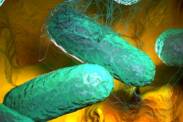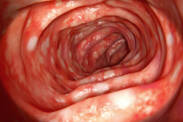Small intestine disorders
Small intestine disorders include

Celiac Disease
Celiac disease is a lifelong condition that requires the complete absence of gluten in the diet. You ask: Why? And what are the consequences of ignoring the diet and leaving the disease untreated?

Crohn's disease - Morbus Crohn
Crohn's disease is an inflammatory bowel disease. It causes many problems. Why does it occur and how does it manifest itself?

Ileus - intestinal obstruction
Ileus is a health problem related to the digestive tract. It is a disorder of intestinal patency. It is one of the so-called sudden abdominal episodes. In some cases, ileus is a life-threatening condition and requires early medical intervention. What are its main causes and how to recognize its characteristic symptoms?

Lactose intolerance
Consuming milk and lactose can cause health problems, especially digestive problems. What is the difference between milk allergy and lactose intolerance? What are the symptoms of dairy intolerance?

Toxoplasmosis
Toxoplasmosis is considered one of the most common parasitic diseases in humans.

Typhoid fever
Typhoid fever is an infectious fever. It is also referred to as intestinal fever because it affects the small intestine. The infection only attacks humans. It occurs mainly in areas with low hygiene standards, in poor countries and in areas with a high concentration of population.

Ulcerative Colitis
Ulcerative colitis is a long-term inflammatory disease of the terminal part of the large intestine, with possible spread to the whole colon. This autoimmune inflammation is characterised by bleeding, suppuration and ulceration of the intestinal mucosa. Its cause has not been clarified. It is characterised by alternating periods of calm and the onset of discomfort such as pain, diarrhoea and bleeding on stool.









